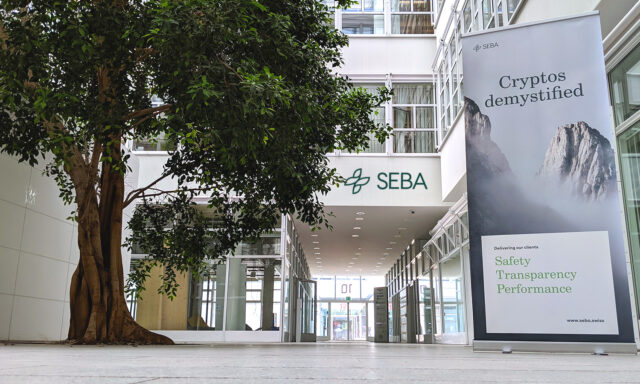On 12th November, Swiss bank SEBA announced that it would be launching its business operations and opening its doors to the public with immediate effect.
SEBA Bank AG is based in Zug, known as the ‘Crypto Valley’ due to its concentration of locally registered blockchain companies attributed to its business-friendly legislation and taxes.
The bank provides cryptocurrency and fiat money services and describes its role of bridging the gap between traditional institutions and new digital token technologies, rather than a so-called ‘challenger bank.
Back in August, SEBA was one of two ‘crypto banks’ to be granted a banking license by FINMA, the Swiss Financial Market Supervisory Authority. The second bank that received approval was Sygnum, which went on to apply for the equivalent license in Singapore later that same month.
“Swiss clients can now officially onboard with an integrated bank for traditional and digital assets…
This sees SEBA make history: as a bank licensed by a reputed supervisory authority, it can offer a comprehensive range of services in the field of digital assets and cryptocurrencies, as well as in traditional banking.”
SEBA Press Release
SEBA stated that it is onboarding customers in multiple phases. Customers in Switzerland can already access “a comprehensive range of services in the field of digital assets and cryptocurrencies, as well as in traditional banking… with an integrated bank for traditional and digital assets”.
Phase two will begin in December 2019 with SEBA expanding membership to “selected foreign jurisdictions”.
Most features will be available to customers in any territory, but some will remain exclusive to business customers in Switzerland, such as opportunity to open a corporate account with a Swiss bank and thus appreciate the benefits of Swiss banking laws with integrated cryptocurrency support.
“We are proud to have founded a bank within 18 months, raised CHF 100 million in capital from investors and obtained a banking and securities dealer licence from FINMA.
The start of operations as the first bank to focus on digital assets is another milestone. We are on track towards creating a new banking experience and redefining the customer–bank relationship.”
Guido Bühler (CEO, SEBA Bank)
Products accessible to all customers include the SEBA debit payments card, a part of an integrated suite along with SEBA e-banking and the SEBA wallet mobile app. Collectively, users can use these apps to manage a portfolio of five popular tokens (Bitcoin, Ether, Stellar, Litecoin, Ether classic) as well as fiat funds.
‘SEBA card’ can be used at an advertised 42 million merchant stores internationally. If spending in cryptocurrency, tokens are converted automatically into fiat at point of sale.
“Customers can manage at least five cryptocurrencies… easily, securely and cost-effectively, and convert them into traditional currencies and vice versa online…
The SEBA Card represents an important step towards the mass introduction of cryptocurrencies,”
Guido Bühler (CEO, SEBA Bank)
Authorities such as the Securities and Exchange Commission (SEC) and the Commodities and Futures Trade Commission (CFTC) in the U.S. have been haphazard in their pattern of convictions, and intentionally vague with the distinction and application of cryptocurrency related legal definitions.
One recurring incident sees the SEC suing organisations and raising charges for incidents as much as three years old, based on the retroactive ruling of the token in question being an unregistered ‘security’.
Telegram’s TON blockchain, for example, was sued a month before its planned launch – with one reason cited being a token sale which took place in 2017.

The Swiss government has been transparent and clear in its messaging by comparison, and consistent in their actions.
Switzerland is considered by many to be a crypto-friendly country and even the Facebook-led Libra Association has made its home there, which has conversely been maligned by lawmakers in the U.S.




